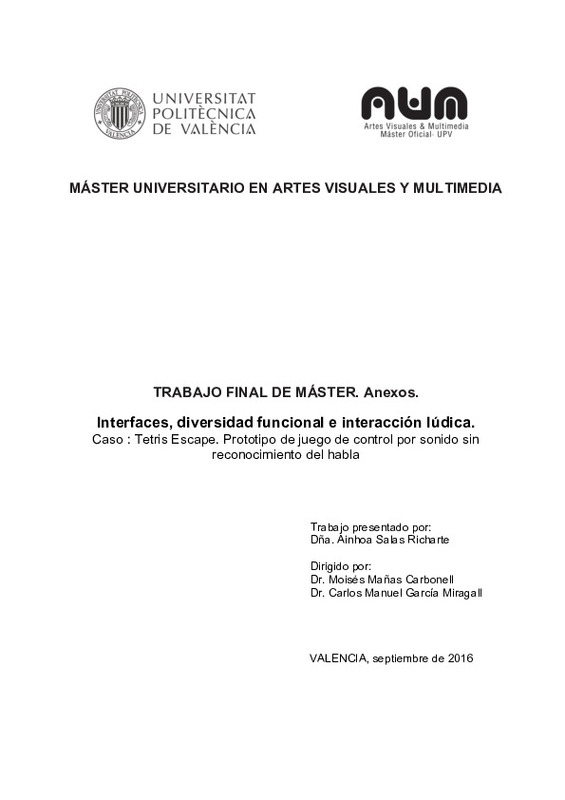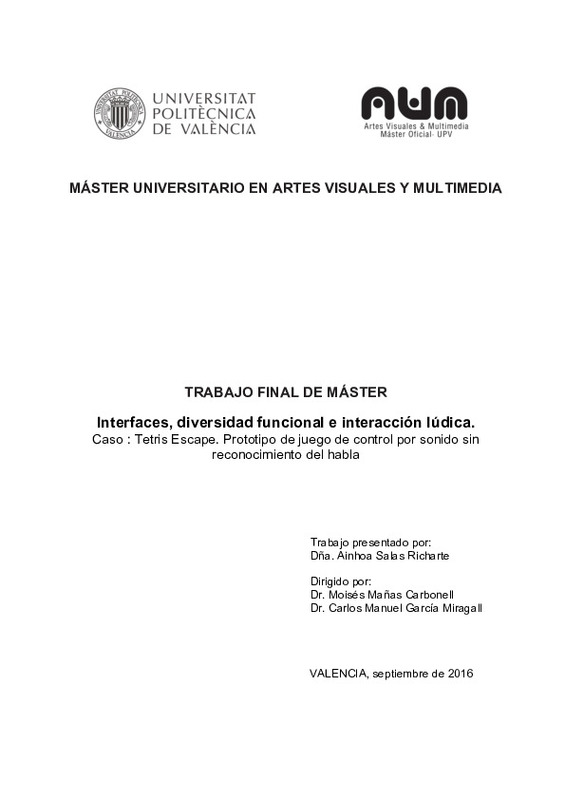JavaScript is disabled for your browser. Some features of this site may not work without it.
Buscar en RiuNet
Listar
Mi cuenta
Estadísticas
Ayuda RiuNet
Admin. UPV
Interfaces, diversidad funcional e interacción lúdica. Caso: Tetris Escape. Prototipo de juego de control por sonido sin reconocimiento del habla
Mostrar el registro sencillo del ítem
Ficheros en el ítem
| dc.contributor.advisor | García Miragall, Carlos Manuel
|
es_ES |
| dc.contributor.advisor | Mañas Carbonell, Moisés
|
es_ES |
| dc.contributor.author | Salas Richarte, Ainhoa
|
es_ES |
| dc.date.accessioned | 2017-01-20T13:10:56Z | |
| dc.date.available | 2017-01-20T13:10:56Z | |
| dc.date.created | 2016-09-28 | |
| dc.date.issued | 2017-01-20 | es_ES |
| dc.identifier.uri | http://hdl.handle.net/10251/77107 | |
| dc.description.abstract | [EN] The social model of disability argues that it is society that disables people, but with the right tolos, they could fully participate in it. This statement uncovers the need for creating a wide range of tools that consider the different needs of interaction for the diversity of skills that individuals of society have. Thus, in this work, in addition of studying an approach to the concept of disability, the relationship of functional diversity with the information society and the need for e-inclusion, we made an analysis of some of the modes of non-traditional interaction contemplating the natural capabilities of human beings. We also study videogames for his social phenomenon consideration and its potential for learning, and propose a prototype of voice-controlled tool without speech recognition, implemented in a game that would be designed for the process of apprehension of the tool to be dynamic | es_ES |
| dc.description.abstract | [ES] Como mantiene el modelo social de discapacidad, es la sociedad la que discapacita a las personas, pero con las herramientas adecuadas pueden participar plenamente en ella. Esta afirmación destapa la necesidad de creación de una amplia gama de herramientas que cubran las diferentes necesidades de interacción para la diversidad de capacidades que tienen los individuos de la sociedad. Así, en este trabajo, además de ver una aproximación al concepto de discapacidad, la relación de la diversidad funcional con la sociedad de la información y la necesidad de e-inclusión, realizamos un análisis de algunos de los modos de interacción no tradicionales que contemplan las capacidades naturales de los seres humanos. Asimismo, estudiamos el videojuego por su carácter de fenómeno social y por su potencial para el aprendizaje y planteamos un prototipo de herramienta controlada por voz sin reconocimiento del habla, implementada en un videojuego que estaría diseñado para dinamizar el proceso de aprehensión de la herramienta. | es_ES |
| dc.language | Español | es_ES |
| dc.publisher | Universitat Politècnica de València | es_ES |
| dc.rights | Reconocimiento (by) | es_ES |
| dc.subject | Technoculture | es_ES |
| dc.subject | Infoexclusion | es_ES |
| dc.subject | Functional diversity | es_ES |
| dc.subject | Social model of disability | es_ES |
| dc.subject | Sound interface | es_ES |
| dc.subject | Human-Computer Interaction (HCI) | es_ES |
| dc.subject | Usability | es_ES |
| dc.subject | Accessibility | es_ES |
| dc.subject | Diversidad funcional | es_ES |
| dc.subject | Modelo de discapacidad | es_ES |
| dc.subject | Infoexclusión | es_ES |
| dc.subject | E-inclusión | es_ES |
| dc.subject | Modos alternativos de interacción | es_ES |
| dc.subject | Interfaces | es_ES |
| dc.subject | VUI | es_ES |
| dc.subject | Interfaces sonoras | es_ES |
| dc.subject | Videojuegos | es_ES |
| dc.subject.classification | ESCULTURA | es_ES |
| dc.subject.classification | LENGUAJES Y SISTEMAS INFORMATICOS | es_ES |
| dc.subject.other | Máster Universitario en Artes Visuales y Multimedia-Màster Universitari en Arts Visuals i Multimèdia | es_ES |
| dc.title | Interfaces, diversidad funcional e interacción lúdica. Caso: Tetris Escape. Prototipo de juego de control por sonido sin reconocimiento del habla | es_ES |
| dc.type | Tesis de máster | es_ES |
| dc.rights.accessRights | Abierto | es_ES |
| dc.contributor.affiliation | Universitat Politècnica de València. Departamento de Escultura - Departament d'Escultura | es_ES |
| dc.description.bibliographicCitation | Salas Richarte, A. (2016). Interfaces, diversidad funcional e interacción lúdica. Caso: Tetris Escape. Prototipo de juego de control por sonido sin reconocimiento del habla. http://hdl.handle.net/10251/77107 | es_ES |
| dc.description.accrualMethod | TFGM | es_ES |
| dc.relation.pasarela | TFGM\46904 | es_ES |







